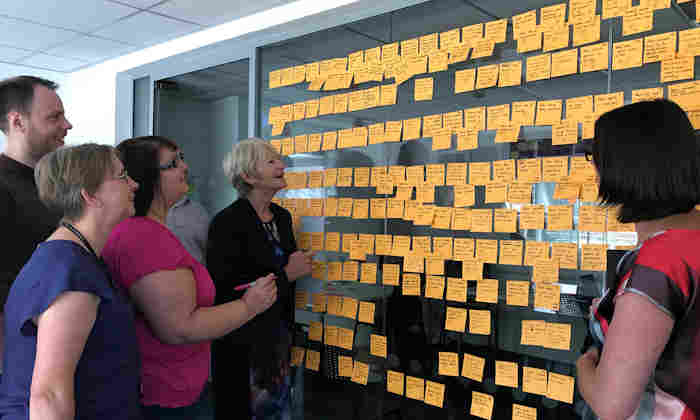Student Lifecycle Project update
03 Jan 2018
Design and Discovery phase sees 450 colleagues at more than 200 days of workshops focus on 14 areas of student lifecycle

The SLP (Student Lifecycle Project) continued at a pace in 2017, with around 450 colleagues from across the University’s Schools, Faculties and central services attending over 200 days of workshops focussing on 14 different areas of the student lifecycle.
During these workshops, which formed part of the project’s Design and Discovery phase, academic and PSS (professional support services) colleagues developed hundreds of proposed business outcomes and the underlying processes required to deliver them.
Just a few examples of the outcomes proposed during the Design and Discovery phase include:
- A digital solution which would allow us to capture leads and deliver pre-application direct marketing in a targeted and segmented way;
- The creation of an offer holder portal, which would allow us to push out key messages and calls-to-action, reduce our efforts in enquiry management and provide a smooth transition to MyManchester;
- A simplified registration process, reduced from 10 steps to three;
- A re-designed and significantly simplified course unit selection process;
- Digitised registers to deliver automated attendance monitoring.
These proposed outcomes, and the hundreds of others designed in a collaborative effort by colleagues across the institution, will pay a key part in shaping the University in future.
Reflecting on the Project’s progress in 2017, Simon Merrywest, the Director for the Student Experience and SLP Business Sponsor, said: “One of the most striking features of the 14 different areas of work is how they have brought together colleagues from many different parts of the University; creating along the way new relationships and a wider understanding and perspective of the challenges of working in different areas.
“I want to recognise the significant contribution made not only by those who have been directly involved in the project, but also by the equivalent number of their colleagues who have taken up the slack created by their absence from the ‘day job’.”
As we move in to 2018, the Project will go through several phases including Integration, where the 14 different areas of the student lifecycle will be brought back together to check for consistencies, overlaps and potential contradictions and a Review period where the University’s Senior Leadership Team will sign off on the technical build and confirm the scope of the initial release.
The information technology and architecture will then enter Development and Build at our IT partner’s development centre. While this is happening, the Student Lifecycle Project will look at Roles and Responsibilities.
During this phase, which will begin in March 2018 and is expected to run to the end of the year, the business outcomes approved for Initial Release during the Review period will be analysed and a picture will begin to emerge of what will sit where within the University from September 2019.
This will essentially allow us to identify a new operating model for the University, which will enable us to effectively deliver all of the business outcomes that will form part of the Initial Release of the SLP in September 2019.
Throughout 2019 training will be provided to ensure staff – academic and PSS – are confident with the new University systems and business processes. Systems will also be tested and data will be migrated.
In September 2019, the Initial Release of the SLP will go live. At this point we will have high quality systems, simplified, effective and efficient processes and a reliable online platform that can be easily updated in future.
This will enable us to deliver a consistent, exceptional and highly personalised learning experience to students, regardless of their mode of study.
More information
For more detailed information about the Student Lifecycle Project and its future phases, visit:
To receive updates and opportunities to get involved with the Project, visit:
